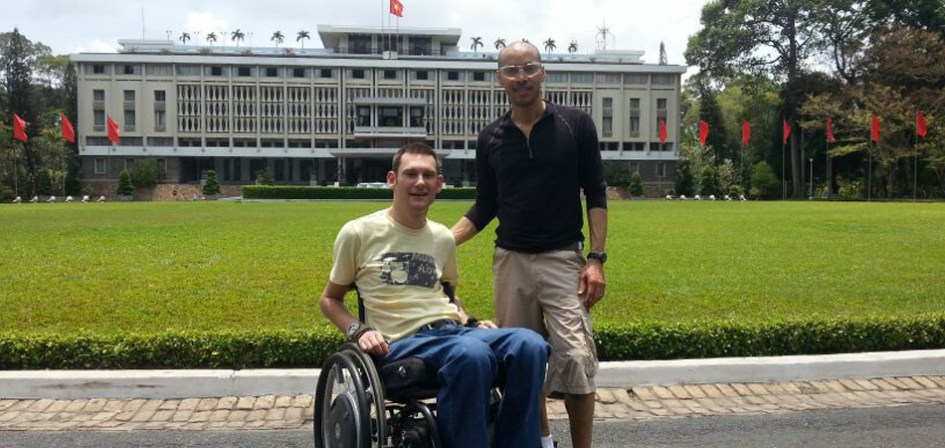Tailor Made Holidays with our travel experts
We'll do our best to call you within 48h

How Vietnam sees handicap
Vietnamese culture has an impact on how they perceive handicap because it is said that "destiny" controls whether families have handicapped children. Handicaps are "explained" by bad karma, or a malicious spirit, which is why families with them are often pointed at. Handicap International's projects are designed to encourage better social and economic inclusion of handicapped people.
Difficulties when you are travelling
The pavements are crowded with cars, motorbikes and street sellers. Their height is also not adapted to wheelchairs. Public transport, like buses and trains, is not designed to be used by handicapped people. Internal flights are a quick way of getting from north to south Vietnam.
Anticipate and adapt
If you want a pleasant trip to Vietnam you really have to book a car and driver in advance. Concentrate on Vietnam's towns: Saigon, Hanoi, Hoi An and Hué, where the hotels have lifts and so are accessible. Some boat trips are possible in these big towns, you need to ask when you reserve the trip and ask for restaurants that are accessible. For example, Hoan Kiem lake at Hanoi is somewhere where you can go on foot or by wheelchair. The Vietnamese, who are always helpful, will be a valuable aid.
MANDATE
Handicap International works in partnership with the Vietnamese authorities to consolidate national methods, strategies and services in the field of health and rehabilitation, social and economic inclusion for people with disabilities, and human rights. Part of the aim in Vietnam is to ensure the sustainability of the models implemented by Handicap International to support the most vulnerable people. There are a total of ten national staff employed and one expatriates working in Vietnam.
BACKGROUND
Since 1989, Handicap International has acted as a technical adviser in implementing projects that focus on the prevention and rehabilitation of disabilities due to war, accidents, congenital defects, and disabling diseases. The Vietnamese population is still suffering from the after-effects of war, due to the disabilities caused by injuries and unexploded instruments of war. The organization has also recently noted victims of congenital deformities caused by dioxin and other toxic products. The country faces a series of modern challenges, including the HIV/AIDS epidemic, road accidents, and industrial accidents. An estimated 15% of the Vietnamese population lives with disability.
ACTIONS
Early Detection of Congenital Malformations
Handicap International has established a pilot model for the prevention, early detection, early intervention, and follow-up for children with common congenital issues. This project includes training, an information campaign, and supplying necessary equipment for health units to deal with congenital differences. 160 specialists in maternal and newborn health care, 487 village health workers, 45,000 women of childbearing age and their spouses, 3,000 pregnant women, and 2,800 infants with and without disabilities have benefited from this project.
Road Safety
Handicap International is trying to create a “road safety culture” in Vietnam by supporting the enforcement of traffic laws and with it's Safe Roads 4 Youth project, which involves holding awareness-raising sessions in primary schools about road safety laws and the dangers of drunk driving.
Advancing Medical Care and Rehabilitation Education (ADMIRE)
The Advancing Medical Care and Rehabilitation Education (ADMIRE) Project launched in 2015, thanks to generous support from USAID. The project develops standardized medical and functional rehabilitation care protocols and strengthens the capacity of reference centers within the Ministry of Health for persons with physical impairments including those due to brain lesions. ADMIRE will improve the lives of 8,000 Vietnamese adults and children with disabilities, train 480 health and rehabilitation staff, enroll more students in physical and occupational therapist diploma programs, and reinforce the country’s rehabilitation centers.
HANDICAP INTERNATIONAL'S PREVIOUS WORK IN VIETNAM HAS INCLUDED:
Ban Advocates Project
Since 2007, Handicap International's Ban Advocates project brought together a group of survivors of cluster munitions. This group testified on the consequences of the use of these weapons on civilians in order to urge policymakers to prohibit indiscriminate weaponry and ensure that affected communities received appropriate care and assistance.
Rehabilitation
In 1989, the Vietnamese Ministry for Health asked Handicap International to set up the first orthopedic workshop in Hanoï. Handicap International later opened two more orthopedic fitting workshops in 1993 and 1994, one in Dalat and one in the province of Dong Ha. Over the following years, at the request of its Vietnamese partners, Handicap International provided technical advice on disability prevention and physical rehabilitation projects. The organization was therefore able to ensure the sustainability of the work carried out in the fields of health, rehabilitation, socioeconomic inclusion, and human rights. This meant consolidating methods, strategies and services offered in conjunction with the Vietnamese authorities to allow them to implement them themselves.